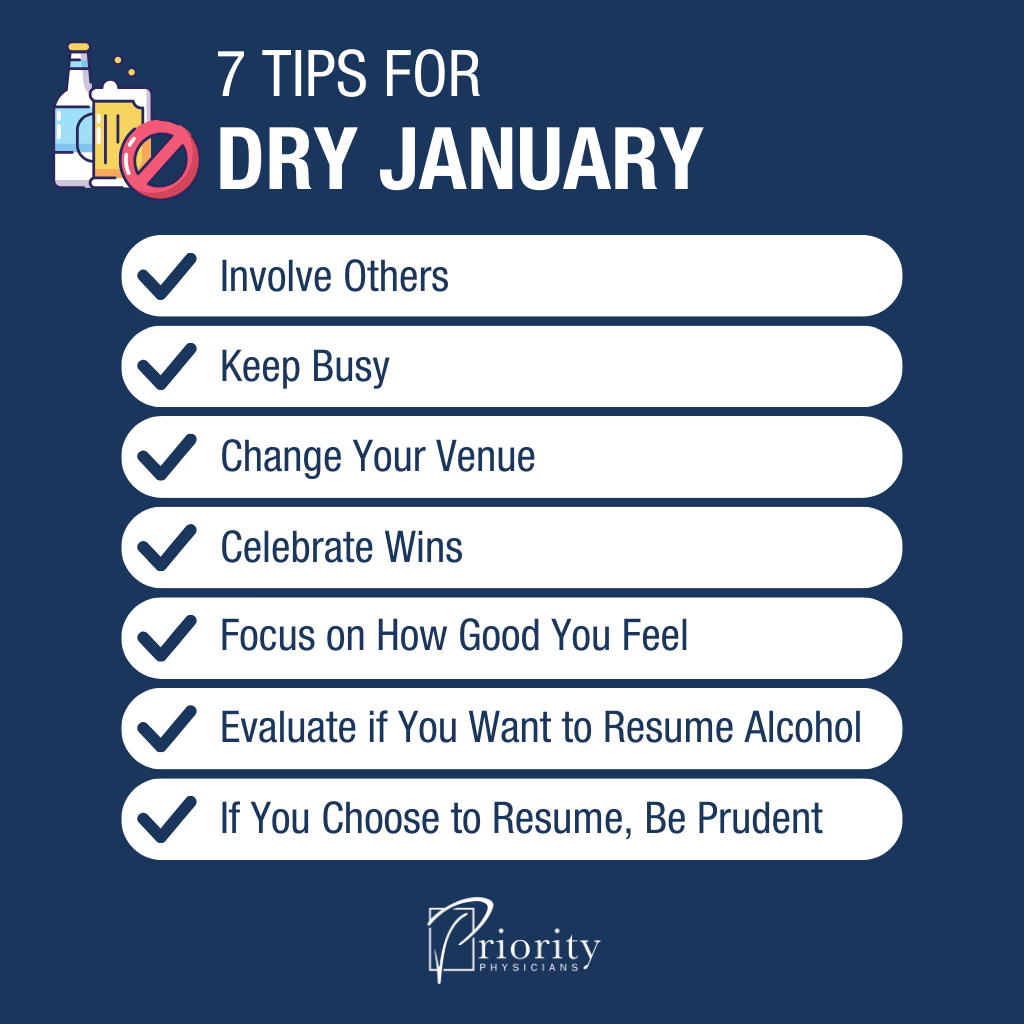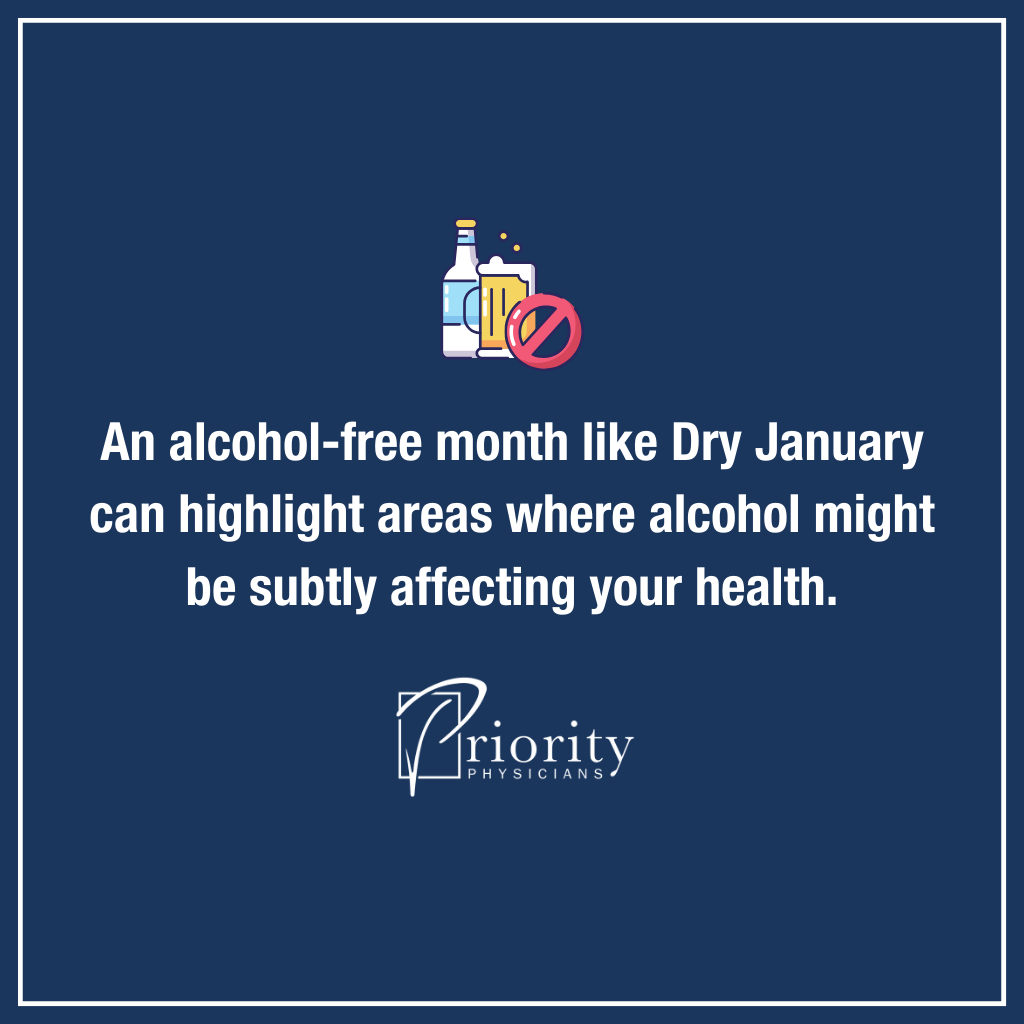Many people know the holidays are officially over when they wake up on New Year’s Day with that last celebratory hangover. That’s when Dry January seems like a sensible move.
If you’re not yet familiar with the term, Dry January is a popular personal challenge in which people go alcohol-free for the entire first month of the new year.
Priority Physicians has some tips for Dry January (and beyond) to help you successfully abstain through the 31st… plus, steps to follow when February rolls around.
Why Try Dry January?
The start of a new year is an excellent time to give your body a break from alcohol. It’s a chance to reset and detox from any overconsumption amidst all the family, social, and work gatherings of Thanksgiving through New Year’s Eve.
Perhaps more importantly, Dry January is a great opportunity to take stock of your drinking habits and evaluate how alcohol affects you. An alcohol-free month like Dry January can highlight areas where alcohol might subtly impact your health:
Sleep Better
Healthy sleep is paramount to healthy living. Unfortunately, and perhaps counterintuitively, alcohol interferes: You sleep less and don’t cycle through the necessary sleep stages, all of which affect your health and energy levels.
Benefit: Abstaining from alcohol can radically improve the quality of your sleep.
Shed a Few Pounds
Alcohol contributes excess calories to your diet and can easily lead to unwanted weight gain. Plus, it lowers your inhibitions, so you may succumb to the lure of larger portions and more snacks when you’re drinking.
Benefit: By cutting out alcohol, you may lose a fast five pounds, depending on how much you typically drink.
Avoid Alcohol Dependence
Alcohol is a drug. With regular consumption, you slowly become tolerant of it… and then dependent on it. Tolerance to alcohol means it gradually takes more and more to get you buzzed. Dependence means you actually crave alcohol and, eventually, you even experience withdrawal symptoms if you don’t get it.
Many people have a drink three or four nights a week, perhaps even nightly, until they discover they can’t fall asleep without their evening cocktail. Their brain receptors have been trained to need it. This is just one aspect of physical alcohol dependence, and it’s cause for serious concern.
Benefit: Taking a break for Dry January gives you the chance to notice if you’re dependent on alcohol — that is, do you crave it?

7 Tips for Dry January
To set yourself up for a successful Dry January, it’s important to plan. A little forethought stacks the deck in your favor.
Try these seven tips for Dry January to help you meet the challenge (and avoid a February rebound):
Tip #1: Involve Others
Tell friends and loved ones you’re taking the Dry January challenge. Ask them to hold you accountable.
Tip #2: Keep Busy
If drinking is a regular habit, you need to fill the void with something else — preferably something healthier. Check in with friends, see a movie, or head out for some exercise at the times you would normally drink. (An added benefit of exercise: It will help you get better sleep.)
Tip #3: Change Your Venue
During Dry January, don’t put yourself in settings where you typically drink alcohol. Avoid the places that serve your favorite wines and cocktails so you’re not tempted.
Tip #4: Celebrate Wins
For each week without a drink, stop and celebrate the accomplishment, especially if getting there is a bit of a struggle. Mark the occasion (but not with alcohol!).
Tip #5: Focus on How Good You Feel
During Dry January, you may find you sleep well, eat better, think more clearly, and have less inflammation with fewer aches and pains. Consider journaling about how good you feel when you’re alcohol-free as a reminder when you want alcohol later on. Plus, noting these benefits can motivate you to keep going!
Tip #6: Evaluate if You Want to Resume Alcohol
Some patients come to me in February complaining of poor sleep, sluggishness, or reduced mental clarity. When I probe, I learn they resumed drinking immediately after Dry January ended. Their symptoms in February are in sharp contrast to the wellness they felt during their alcohol-free January.
Reflect on how you felt during January and the known downsides of alcohol (such as its status as a known carcinogen). Even if you don’t decide to stop drinking completely, you might decide to reduce your consumption to improve your health.
Tip #7: If You Choose to Drink Again, Be Prudent
After a month without alcohol, be mindful that your tolerance is now lower. Your body hasn’t processed alcohol for 31 days, so the usual amount will suddenly hit you harder. Ease back into it.

The Time’s Always Right to Try a Break From Alcohol
At Priority Physicians, your dedicated concierge doctor is happy to meet with you anytime to discuss alcohol’s effects and help you understand your motivations for drinking.
We’ll work with you to develop a plan to drink less and enjoy better health. Reach out.

